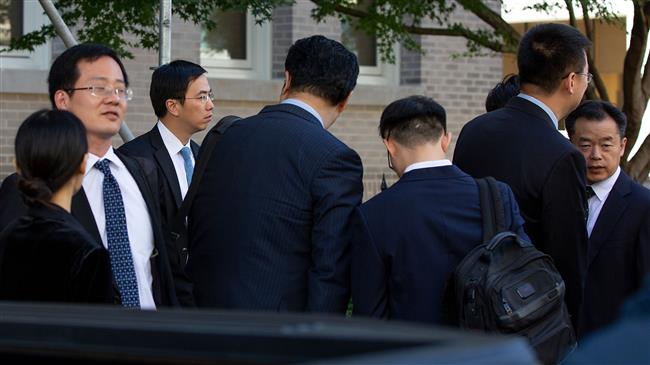US, Chinese trade negotiators to meet in Washington despite deep differences
Trade negotiators from the US and China are preparing to resume talks for the first time in nearly two months, as the world’s two largest economies try to find a way out of a protracted trade war.
The negotiations will be held in Washington on Thursday and Friday by American and Chinese deputy trade officials.
A delegation of about 30 Chinese officials, led by Vice Finance Minister Liao Min, arrived at the US Trade Representative’s (USTR) office near the White House for the talks on Wednesday. Deputy US Trade Representative Jeffrey Gerrish also arrived to represent the United States.
The talks are aimed at laying the groundwork for high-level meetings in early October that will determine whether the two countries are working toward a solution or headed for new and higher tariffs on each other’s products.
A person with knowledge of the planned discussions told Reuters that the discussions are likely to focus on agriculture, including US demands that China significantly increase purchases of American soybeans and other farm commodities.
Another negotiating session will be devoted to the strengthening of China’s intellectual property protections and the forced transfer of US technology to Chinese firms, the source said.
US President Donald Trump is eager to provide export opportunities for US farmers, a key Trump political constituency that has been battered by China’s retaliatory tariffs on US soybeans and other agricultural commodities.
Trump has said that China failed to follow through on agricultural purchase commitments made by its president, Xi Jinping, at a G20 leaders summit in Osaka, Japan as a goodwill gesture to get stalled talks back on track. China has denied making such commitments.
The trade war, which has dragged on for 14 months, has increased the specter of a global recession.
US tariffs of 25 percent imposed last year on $250 billion of Chinese goods are due to rise to 30 percent on October 1.
Washington also imposed 15 percent tariffs on September 1 on $112 billion of Chinese imports and plans to hit another $160 billion on December 15. That would extend penalties to almost everything the United States buys from China.
Despite the planned discussions in September and October, trade experts and government officials say the US-China trade war runs far deeper than tariffs and could take years to resolve.
Jon Lieber, a principal in PwC’s national tax services practice, said a “very narrow agreement” in October would do little to solve fundamental differences between the two countries.
‘All wars have rules. All of those rules have been broken’ by Israel
VIDEO | Report flags India’s violation of rights of Rohingya detainees
Turkey's foreign minister meets Syria's de facto leader in Damascus
'Next to impossible' to rescue patients from Gaza's Kamal Adwan Hospital: Director
VIDEO | Vietnam current prosperity
Report blames gasoil exports for shortage at Iranian power plants
VIDEO | Hind Rajab Foundation names Israeli war criminals vacationing after Gaza genocide
VIDEO | Australians rally for Gaza ahead of Christmas festivities











 This makes it easy to access the Press TV website
This makes it easy to access the Press TV website